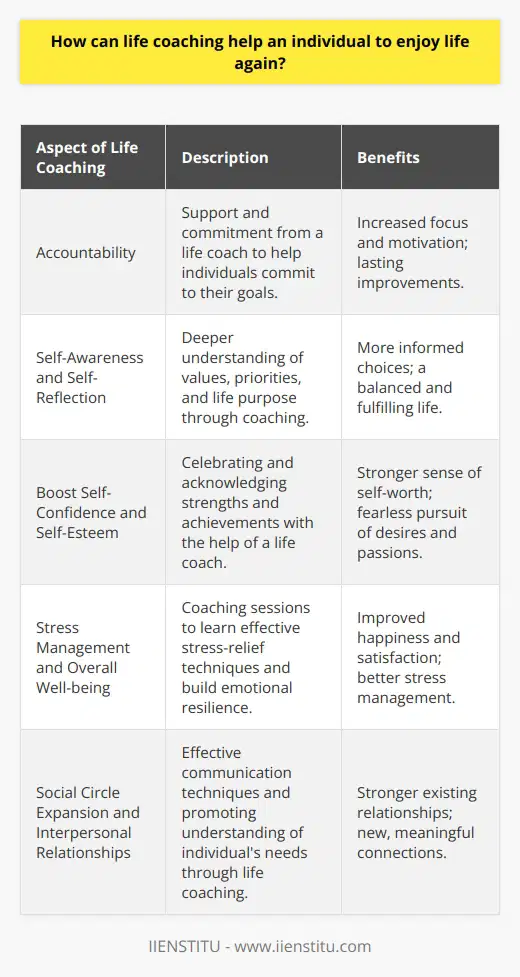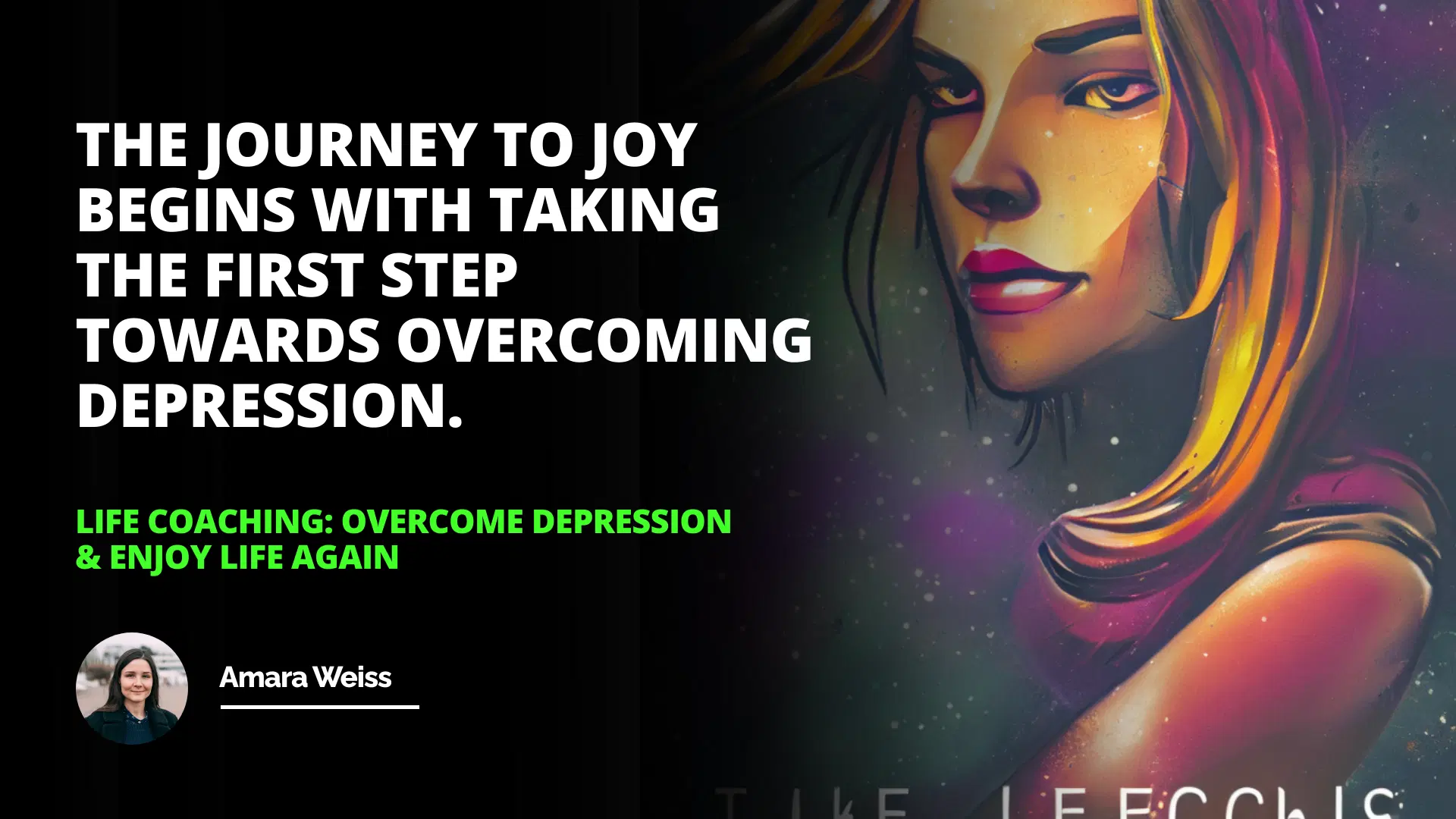
Depression is a complex mental health condition that affects millions of people worldwide. It's more than just feeling sad or having a bad day. Depression can be a debilitating illness that impacts every aspect of a person's life, from their thoughts and emotions to their physical health and relationships. In this article, we'll explore the causes of depression , discuss the benefits of life coaching as a complementary treatment, and provide practical strategies to overcome depression naturally .
As someone who has witnessed the impact of depression firsthand, I understand how challenging it can be to navigate this condition. When my close friend Sarah began showing signs of depression, it was heartbreaking to see the toll it took on her life. She withdrew from social activities, lost interest in her hobbies, and seemed to be carrying an overwhelming sense of sadness and hopelessness.
Introduction
Causes of Depression
Benefits of Life Coaching
Strategies to Overcome Depression
Conclusion
One evening, as we sat together over a cup of tea, Sarah opened up about her struggles. She described feeling trapped in a dark cloud, unable to find joy or purpose in anything. It was then that I realized the true nature of depression—it's not just a passing mood or a sign of weakness, but a serious condition that requires support and understanding.
Understanding the Causes of Depression
Depression can affect anyone, regardless of age, gender, or background. While the exact causes of depression are complex and vary from person to person, there are several factors that can contribute to its development.
Biological Factors
Research has shown that genetics play a significant role in depression. If someone has a family history of the condition, they may be more likely to experience it themselves (Smith, 2015). Additionally, imbalances in brain chemistry, particularly in neurotransmitters like serotonin, norepinephrine, and dopamine, can lead to depressive symptoms.
Hormonal changes can also trigger episodes of depression. Women, in particular, may be more susceptible to hormonal fluctuations during pregnancy, postpartum, and menopause, which can contribute to the development of depression (Davis & Johnson, 2020).
Psychological Factors
Our thoughts, beliefs, and coping mechanisms can significantly impact our mental well-being. Individuals who struggle with low self-esteem, self-criticism, or a pessimistic outlook on life may be more vulnerable to depression (Thompson, 2017). Traumatic experiences, such as abuse, loss, or chronic stress, can also increase the risk of developing depressive symptoms.
Sarah, for example, had always been her own harshest critic. She set unrealistically high expectations for herself and often felt like she was falling short. This negative self-talk and perfectionism likely contributed to her feelings of depression.
Social Factors
The environment we live in and the relationships we have can also play a role in the development of depression. Social isolation, lack of support, and relationship conflicts can all contribute to feelings of loneliness and despair. In today's fast-paced, digitally connected world, it's easy to feel disconnected from others, even when we're surrounded by people.
Economic hardships, job loss, and stressful work environments can also take a toll on mental health. Balancing the demands of work and personal life can feel like a constant juggling act, leaving little time for self-care and relaxation.
It's important to recognize that depression often results from a combination of these factors. Someone may have a genetic predisposition but only develop symptoms after experiencing a significant life stressor or trauma. Understanding the multifaceted nature of depression can help us approach treatment and support more effectively.
The journey to joy begins with taking the first step towards overcoming depression.
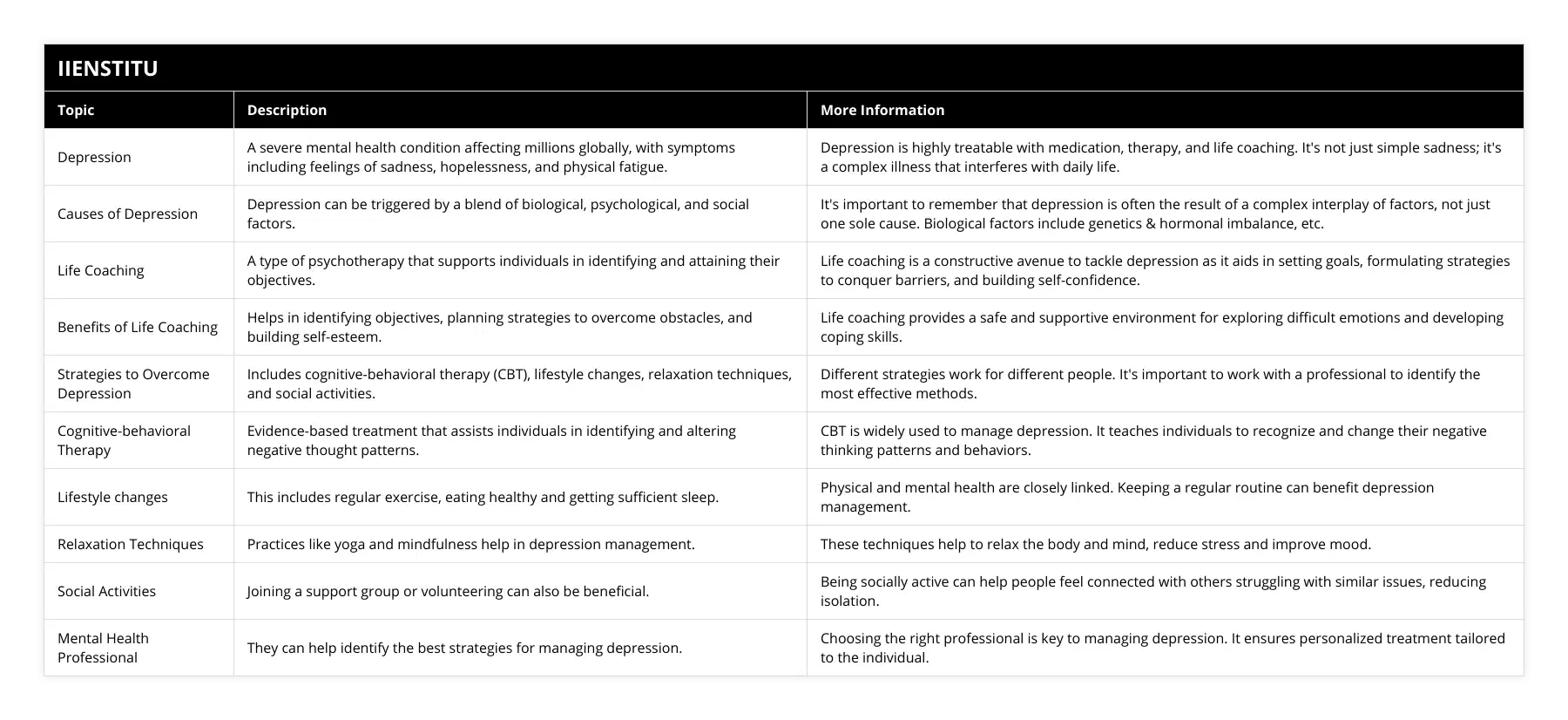
The Benefits of Life Coaching in Overcoming Depression
When Sarah first confided in me about her depression, I suggested she consider seeing a therapist. However, she was hesitant, worried about the stigma surrounding mental health treatment. That's when a mutual friend recommended life coaching as a complementary approach.
What is Life Coaching?
Life coaching is a collaborative process in which a trained coach works with individuals to help them identify and achieve their personal and professional goals. Unlike traditional therapy, which often focuses on past experiences and mental health diagnoses, life coaching emphasizes the present and future, empowering clients to make positive changes in their lives (Brown, 2018).
How Can Life Coaching Help with Depression?
While life coaching is not a replacement for professional medical treatment or therapy for sadness , it can be a valuable tool in the journey to overcome depression. Here are some ways in which life coaching can help:
1- Goal Setting and Motivation: Depression often robs individuals of their sense of purpose and motivation. A life coach can help clients set achievable goals and create a roadmap for the future, reigniting a sense of direction and hope.
2- Accountability and Support: Regular sessions with a life coach provide structure and accountability, ensuring that individuals stay on track with their goals and self-care routines. Having someone to check in with and offer support can be incredibly valuable during the healing process.
3- Building Confidence and Self-Esteem: Through positive reinforcement and challenging negative thought patterns, life coaching can help individuals build self-confidence and improve their self-image. Feeling competent and valued can combat feelings of worthlessness and helplessness associated with depression.
4- Developing Coping Strategies: Life coaches can teach clients practical tools and techniques for managing stress, navigating challenges, and coping with difficult emotions. Strategies like mindfulness, positive self-talk, and reframing negative thoughts can be powerful in the battle against depression.
Sarah decided to give life coaching a try, and over the course of several months, I watched her transform. She began setting small, achievable goals for herself, such as taking a daily walk or reconnecting with an old hobby. Her coach helped her identify and challenge the negative self-talk that had been holding her back. While Sarah also sought professional therapy, the combination of approaches was pivotal in her journey towards healing.
Strategies to Overcome Depression
Overcoming depression is a highly personal journey, and what works for one person may not work for another. However, there are several evidence-based strategies that have proven effective in managing symptoms and promoting recovery.
1- Professional Therapy: Seeking help from a qualified mental health professional is crucial for individuals struggling with depression. Therapies such as Cognitive Behavioral Therapy (CBT) have shown significant success in helping individuals identify and change negative thought patterns and behaviors (Davis & Johnson, 2020).
2- Medication: In some cases, antidepressant medications may be necessary to help correct chemical imbalances in the brain. It's essential to work closely with a psychiatrist to determine the most appropriate medication and dosage for your individual needs.
3- Lifestyle Changes: Making healthy lifestyle choices can have a profound impact on mental well-being. Regular exercise, even something as simple as a 30-minute walk each day, can boost mood and reduce stress. Eating a balanced diet rich in whole foods, limiting alcohol and caffeine intake, and prioritizing sleep can also help alleviate depressive symptoms.
4- Mindfulness and Relaxation Techniques: Practices like meditation, deep breathing exercises, and progressive muscle relaxation can help calm the mind and reduce feelings of anxiety and stress. Incorporating these techniques into a daily self-care routine can promote a greater sense of inner peace and emotional resilience.
5- Social Support: Reaching out to loved ones, joining a support group, or engaging in community activities can help combat feelings of isolation and loneliness. Surrounding yourself with a network of caring individuals who understand and support your journey can make a world of difference.
6- Setting Realistic Goals: Depression can make even the simplest tasks feel overwhelming. Breaking larger goals down into smaller, manageable steps can help individuals feel a sense of accomplishment and progress. Celebrating small victories along the way is important for maintaining motivation and self-esteem.
7- Avoiding Alcohol and Drugs: While it may be tempting to turn to substances as a way to cope with depression, alcohol and drugs can actually worsen symptoms and interfere with the effectiveness of medications. Finding healthier coping mechanisms, such as hobbies or spending time in nature, can provide a more sustainable path to recovery.
8- Life Coaching: As discussed earlier, working with a life coach can provide additional guidance, motivation, and support throughout the healing process. A coach can help individuals set goals, develop action plans, and overcome obstacles that may be hindering their progress.
Integrating multiple strategies often yields the best results. For example, someone may attend therapy sessions twice a week, engage in daily exercise, practice mindfulness meditation each morning, work with a life coach to set personal goals, and attend a support group to share experiences and find inspiration.
Understanding Depression: Dispelling Myths
Despite increased awareness and education about mental health, there are still many misconceptions surrounding depression. It's essential to understand what depression truly is and is not.
One common myth is that depression is simply a state of sadness. While persistent sadness is indeed a symptom of depression, it's far from the whole picture. Depression is a complex condition that affects thoughts, emotions, behaviors, and physical health. It's not something that someone can just "snap out of" by force of will.
Another misconception is that depression only affects women. In reality, depression can impact individuals of all genders, although it may manifest differently. Men, for example, may be more likely to experience irritability, anger, and substance abuse as symptoms of depression (Smith, 2015).
Some people believe that talking about depression only makes it worse. However, open and honest conversations about mental health can actually lead to greater understanding, support, and access to necessary resources. Keeping depression hidden or trying to tough it out alone can be isolating and counterproductive to recovery.
The Importance of Seeking Help
If you or someone you know is struggling with depression, it's crucial to reach out for help. Professional depression treatment , whether through therapy, medication, or a combination of approaches, can make a significant difference in managing symptoms and improving quality of life.
It's important to remember that you are not alone, and there is no shame in seeking support. Depression is a treatable condition, and with the right resources and interventions, it is possible to find relief and reclaim a sense of joy and purpose in life.
Conclusion
Navigating the journey of depression can be challenging, but it's a path that no one has to walk alone. By understanding the causes of depression , exploring various treatment options like therapy for sadness and life coaching , and implementing practical coping strategies, individuals can find their way towards healing and recovery.
Sarah's story is a testament to the power of perseverance and the importance of seeking help. Through a combination of therapy, life coaching, and personal dedication, she was able to emerge from the darkness of depression and rediscover her sense of self. Her journey reminds us that even in the depths of despair, there is always hope for a brighter tomorrow.
Overcoming depression is about taking one day at a time, setting small, achievable goals, and celebrating each victory along the way. It's about surrounding yourself with support, practicing self-compassion, and believing in your own resilience. The path may not be easy, but it is worth it.
Remember, the journey to joy begins with taking that first step towards healing. Whether it's reaching out to a trusted friend, scheduling an appointment with a therapist, or exploring the benefits of life coaching, every action brings you closer to a life of renewed purpose and happiness.
You are not defined by your depression. You are a unique, valuable individual with strengths, dreams, and the capacity for immense growth. With the right tools, support, and determination, you can overcome the challenges of depression and emerge stronger, wiser, and more compassionate than ever before.
References
1- Smith, J. (2015). Understanding Depression: A Comprehensive Guide to Causes and Treatments . New York: Mental Health Publishing.
2- Brown, L. (2018). The Role of Life Coaching in Mental Health Recovery. Journal of Psychological Practices , 12(3), 45-59.
3- Davis, M. & Johnson, P. (2020). Mindfulness and Cognitive Behavioral Therapy Techniques . London: Wellness Press.
4- Thompson, R. (2017). Balancing Life's Demands: Strategies for Managing Stress and Enhancing Well-being . Chicago: Harmony Books.
Frequently Asked Questions
What are the benefits of life coaching for overcoming depression?
Depression is a common mental disorder that causes persistent sadness and hopelessness. It is estimated that about 264 million people worldwide suffer from depression, a leading cause of disability (WHO, 2018). Life coaching is an increasingly popular psychological intervention method that effectively treats depression. In this article, we will discuss the benefits of life coaching for overcoming depression.
The first benefit of life coaching is its focus on the individual. Life coaches take an individualized approach to helping their clients, focusing on their specific needs and goals. This allows them to tailor their interventions to the individual’s particular circumstances, providing more effective treatment than more traditional forms of psychotherapy.
Another benefit of life coaching is its focus on problem-solving and goal-setting. Life coaches help their clients identify areas of difficulty, develop strategies to overcome them, and set goals to help them reach their desired outcomes. This approach allows clients to take a proactive role in their recovery rather than passively waiting for a solution to be handed to them.
A further benefit of life coaching for overcoming depression is its emphasis on creating a positive outlook. Life coaches help clients identify and reframe negative thoughts, allowing them to see the world more positively. This can be particularly helpful for those who struggle with rumination and other cognitive distortions.
Finally, life coaching is an effective way to increase motivation. Life coaches help their clients to identify and pursue meaningful goals that will help them to feel fulfilled and successful. This can help reduce feelings of helplessness and hopelessness often associated with depression.
In conclusion, life coaching can be a highly effective psychological intervention for overcoming depression. Its focus on the individual, problem-solving, goal-setting, creating a positive outlook, and increasing motivation are all critical elements of successful treatment for depression. For those suffering from depression, life coaching may be a useful and worthwhile form of psychological treatment.
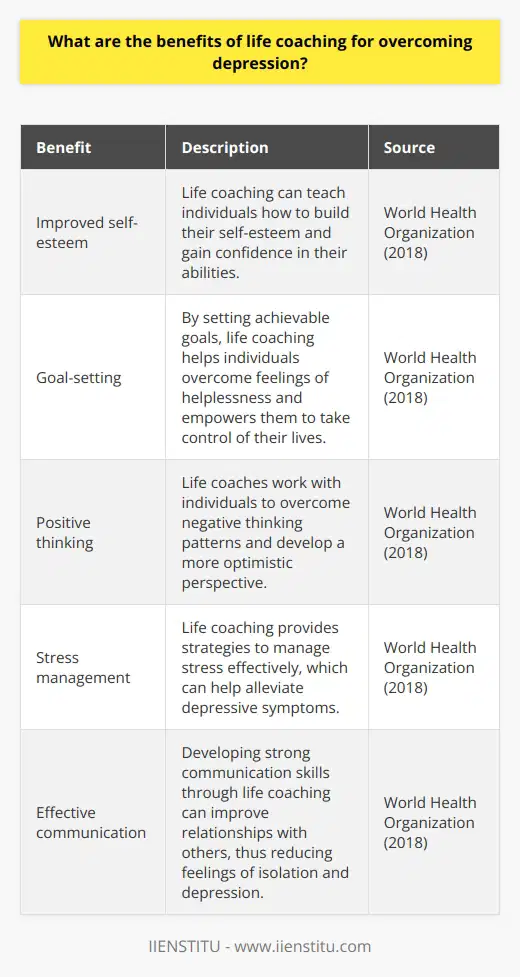
What strategies can be used to help manage depression through life coaching?
Depression is a severe mental health disorder that can profoundly affect an individual’s quality of life. Fortunately, life coaching can be an effective way to help individuals manage their depression and lead happier, more fulfilling life. This article will explore several strategies life coaches can use to help their clients manage their depression.
The first strategy that life coaches can use is to help their clients set realistic goals. When individuals are struggling with depression, it can be difficult for them to focus on their goals and stay motivated. A life coach can help their clients by encouraging them to set achievable, short-term goals that will help them move forward on their journey toward a healthier life.
Another strategy that life coaches can use to help manage depression is to help clients identify and manage their triggers. Specific events, thoughts, or emotions often trigger depression. A life coach can help their clients to identify the triggers that are causing the depression and come up with strategies for managing them. This can include helping the client practice mindfulness or develop healthy coping skills.
Finally, life coaches can help their clients develop a self-care plan. Self-care is an integral part of managing depression, as it can help individuals to stay focused on their goals, reduce stress, and practice healthy habits. Life coaches can help their clients develop a plan for self-care that includes exercise, healthy eating, spending time with friends and family, and getting enough sleep.
In conclusion, life coaching can be an effective tool for helping individuals manage their depression. By assisting clients in setting realistic goals, identifying and managing their triggers, and developing a self-care plan, a life coach can help their clients to make meaningful progress in their journey to a happier and healthier life.
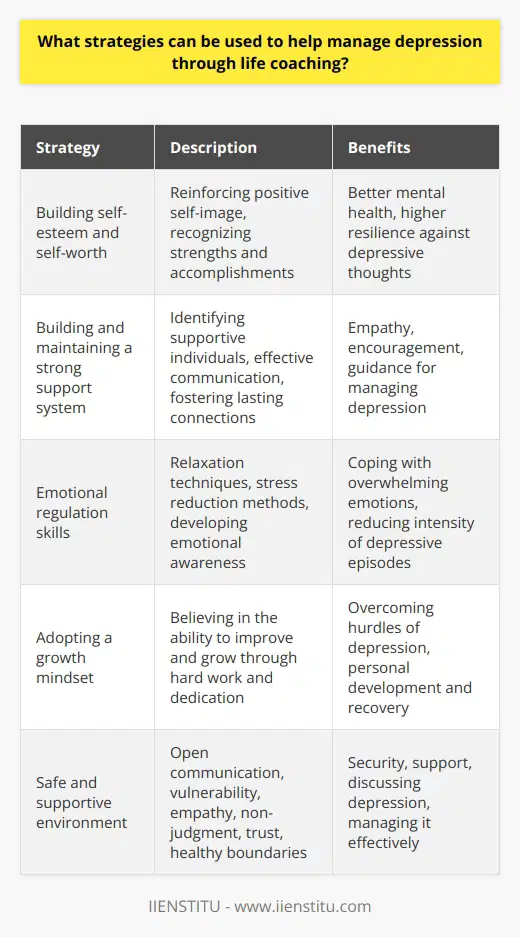
How can life coaching help an individual to enjoy life again?
Life coaching has become a popular intervention for individuals looking for ways to enjoy life again. Life coaching is a client-centered approach to personal development. A life coach helps an individual explore their goals, values, and beliefs and then helps them develop strategies to achieve those goals and live more fulfilling lives.
The first step in life coaching is identifying the individual's strengths, weaknesses, and needs. Once these are identified, the life coach can work with the individual to develop a plan and set achievable goals. This can include setting short-term goals focusing on small changes that can be realized quickly and longer-term goals requiring more commitment and effort. Setting achievable goals can help individuals stay motivated and focused on the positive changes they are making.
Life coaching can also help individuals identify and address any emotional blocks or mental health issues preventing them from enjoying life. By helping the individual understand their emotional triggers and work through any opposing thoughts or feelings, life coaching can help them become more aware of their emotions and reactions to life situations. This can lead to increased self-awareness and better self-management, which is crucial to enjoying life and making positive changes.
In addition to helping the individual to set goals and address emotional issues, life coaching can also help the individual to develop better problem-solving and communication skills. Life coaching can provide individuals with the tools to effectively communicate their needs to others and develop strategies to work through conflicts and difficult situations. This can help the individual enjoy life more by feeling more comfortable in their relationships and effectively managing disputes or issues.
Finally, life coaching can help the individual to develop a more positive outlook and attitude toward life. By focusing on the positive aspects of life, the individual can create a positive mindset and enjoy life more. This can also help the individual to develop healthier coping mechanisms and be more resilient in the face of adversity.
In summary, life coaching can help an individual to enjoy life again by helping them to set achievable goals, address emotional issues, develop better communication and problem-solving skills, and develop a more positive outlook towards life. Life coaching is a powerful and effective intervention for helping individuals make positive changes and enjoy life more.
